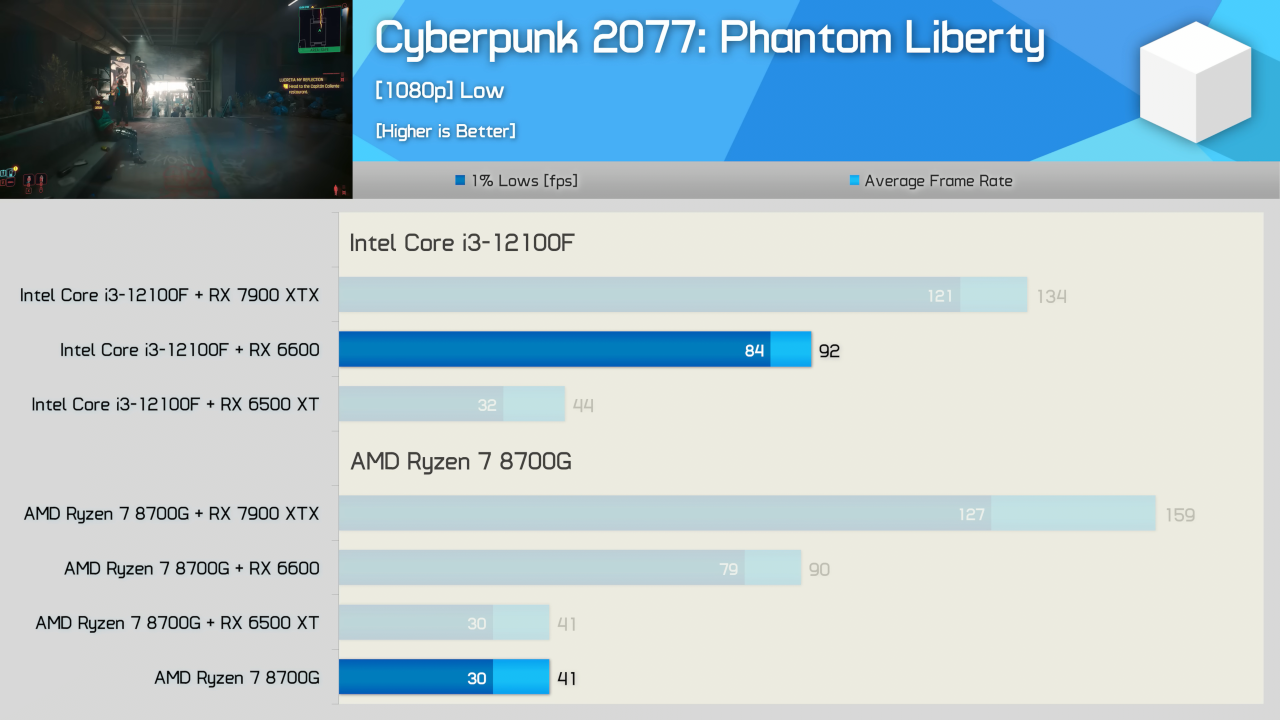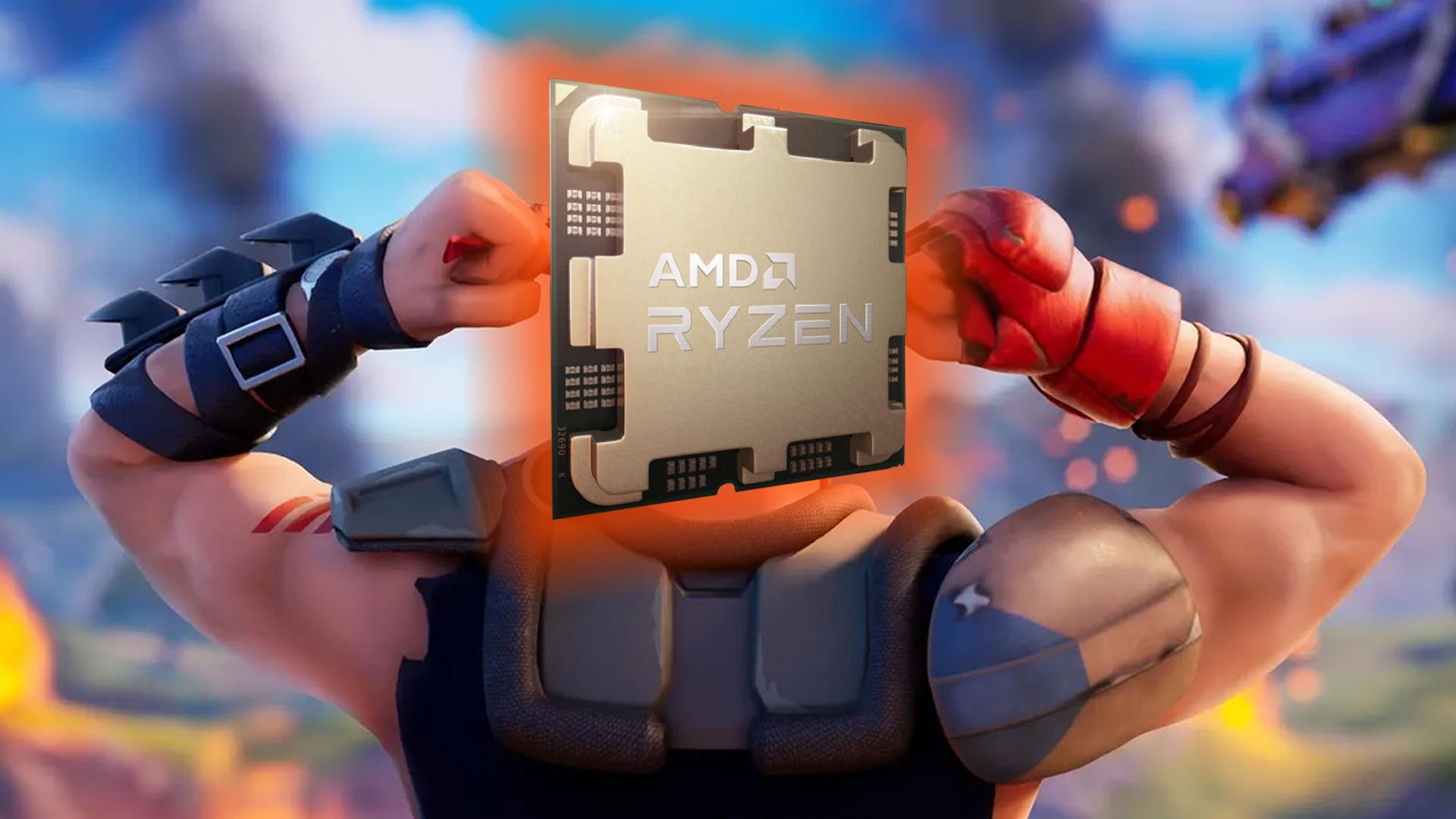AMD’s new CPU hits 132fps in Fortnite without a graphics card::Also get 49fps in BG3, 119fps in CS2, and 41fps in Cyberpunk 2077 using the new AMD Ryzen 8700G, all without the need for an extra CPU cooler.
I have routinely been impressed with AMD integrated graphics. My last laptop I specifically went for one as it meant I didn’t need a dedicated gpu for it which adds significant weight, cost, and power draw.
It isn’t my main gaming rig of course; I have had no complaints.
Same. I got a cheap Ryzen laptop a few years back and put Linux on it last year, and I’ve been shocked by how well it can play some games. I just recently got Disgaea 7 (mostly to play on Steam Deck) and it’s so well optimized that I get steady 60fps, at full resolution, on my shitty integrated graphics.
I have a Lenovo ultralight with a 7730U mobile chip in it, which is a pretty mid cpu… happily plays minecraft at a full 60fps while using like 10W on the package. I can play Minecraft on battery for like 4 hours. It’s nuts.
AMD does the right thing and uses their full graphics uArch CU’s for the iGPU on a new die, instead of trying to cram some poorly designed iGPU inside the CPU package like Intel does.
I was sold on AMD once I got my Steamdeck.
same here. or at least i finally recognized their potential. but it’s not just the performance, it’s the power efficiency too!
Everything I see about AMD makes me like them more than Intel or Nvidia (for CPU and GPU respectively). You can’t even use an Nvidia card with Linux without running into serious issues.
I mean they make the chips in PS5 and xbox too.
deleted by creator
AMD’s integrated GPUs have been getting really good lately. I’m impressed at what they are capable of with gaming handhelds and it only makes sense to put the same extra GPU power into desktop APUs. This hopefully will lead to true gaming laptops that don’t require power hungry discrete GPUs and workarounds/render offloading for hybrid graphics. That said, to truly be a gaming laptop replacement I want to see a solid 60fps minimum at at least 1080p, but the fact that we’re seeing numbers close to this is impressive nonetheless.
Common W for AMD
Oh, oh ok I thought one of the new Threadrippers is so powerful that the CPU can do all those graphics in Software.
It’s gonna take decades to be able to render 1080p CP2077 at an acceptable frame rate with just software rendering.
It’s all software, even the stuff on the graphics cards. Those are the rasterisers, shaders and so on. In fact the graphics cards are extremely good at running these simple (relatively) programs in an absolutely staggering number of threads at the same time, and this has been taken advantage of by both bitcoin mining and also neural net algorithms like GPT and Llama.
It’s a shame you’re being downvoted; you’re not wrong. Fixed-function pipelines haven’t been a thing for a long time, and shaders are software.
I still wouldn’t expect a threadripper to pull off software rendering a modern game like Cyberpunk, though. Graphics cards have a ton of dedicated hardware for things like texture decoding or ray tracing, and CPUs would need to waste even more cycles to do those in software.
Only downside if integrated graphics becomes a thing is that you can’t upgrade if the next gen needs a different motherboard. Pretty easy to swap from a 2080 to a 3080.
Integrated graphics is already a thing. Intel iGPU has over 60% market share. This is really competing with Intel and low-end discrete GPUs. Nice to have the option!
Yeah, I know integrated graphics is a thing. And that’s been fine for running a web browser, watching videos, or whatever other low-demand graphical application was needed for office work. Now they’re holding it up against gaming, which typically places large demands on graphical processing power.
The only reason I brought up what I did is because it’s an if… if people start looking at CPU integrated graphics as an alternative to expensive GPUs it makes an upgrade path more costly vs a short term savings of avoiding a good GPU purchase.
Again, if one’s gaming consists of games that aren’t high demand like Fortnite, then upgrades and performance probably aren’t a concern for the user. One could still end up buying a GPU and adding it to the system for more power assuming that the PSU has enough power and case has room.
For a slightly different perspective, I will not game on anything other than a Steamdeck. So, this is kind perfect for me. But, I am a long hauler with hardware so I typically upgrade everything all at once anyway.
AMD has been pretty good about this though, AM4 lasted 2016-2022. Compare to Intel changing the socket every 1-2 years, it seems.
Actually AMD is still releasing new AM4 CPUs now. 5700x3D was just announced.
That’s true but I’m excited about the future of laptops. Some of the specs are getting really impressive while keeping low power draw. I’m currently jealous of what Apple has accomplished with literal all day battery life in a 14inch laptop. I’m hopeful some of the AMD chips will get us there in other hardware.
Could you not just slot in a dedicated video card if you needed one, keeping the integrated as a backup?
Yeah, maybe. I commented on that elsewhere here. If we follow a possible path for IG - the elimination of a large GPU could result in the computer being sold with a smaller case and lower-power GPU. Why would you need a full tower when you can have a more compact PC with a sleek NVMe/SSD and a smaller motherboard form factor? Now there’s no room to cram a 3080 in the box and no power to drive it.
Again, someone depending on CPU IG to play Fortnite probably isn’t gonna be looking for upgrade paths. this is just an observation of a limitation imposed on users should CPU IG become more prominent. All hypothetical at this point.
Or y’know, upgrade the case at the same time.
Or even build the computer yourself. Outside of the graphics card shortage a couple of years back, it’s usually been cheaper to source parts yourself than pay an OEM for a prebuilt machine.
A small side note: If you buy a Dell/Alienware machine, you’re never upgrading just the case. The front panel IO is part of the motherboard, and the power supply is some proprietary crap. If you replace the case, you need to replace the motherboard, which also requires you to replace the power supply. At that point, you’ve replaced half the computer.
Same thing with HP. Their “Pavillion” series of Towers contains a proprietary motherboard and power supply. Also, on the model a friend of mine had, the CPU was AMD, but the cooler scewed on top was designed for intel-purposed boards, so it looked kinda frankensteined.
So in essence, it’s the same with HP.
And the shared RAM. Games like Star Trek Fleet Command will crash your computer by messing with that/memory leaks galore. Far less crashy with a dedicated GPU. How many other games interact poorly with integrated GPUs?
AMD keeps the same sockets for ages. I was able to upgrade a 5 year old Ryzen 5 2600G to a 5600G last month. Can’t do that with Intel in general.
or it may end up making for a push for longer lifetimes for motherboards
For people like me who game once a month, and mostly stupid little game, this is great news. I bet many people could use that, it would reduce demand for graphic card and allow those who want them to buy cheaper.
Mind you that it can get these frame rates at the low setting. While this is pretty damn impressive for a APU, it’s still a very niche market type of APU at this point and I don’t see this getting all that much traction myself.
I think the opposite is true. Discrete graphics cards are on the way out, SoCs are the future. There are just too many disadvantages to having a discrete GPU and CPU each with it’s own RAM. We’ll see SoCs catch up and eventually overtake PCs with discrete components. Especially with the growth of AI applications.
People will be building dedicated AI PCs.
They may build dedicated PCs for training, but those models will be used everywhere. All computers will need to have hardware capable of fast inference on large models.
I agree, especially with the prices of graphics card being what they are. The 8700G can also fit in a significantly smaller case.
Unified memory is also huge for performance of AI tasks. Especially with more specialized accelerators being integrated into SoCs. CPU, GPU, Neural Engine, Video encoder/decoders, they can all access the same RAM with zero overhead. You can decode a video, have the GPU preprocess the image, then feed it to the neural engine for whatever kind of ML task, not limited by the low bandwidth of the PCIe bus or any latency due to copying data back and forth.
My predictions: Nvidia is going to focus more and more on the high-end AI market with dedicated AI hardware while losing interest in the consumer market. AMD already has APUs, they will do the next logical step and move towards full SoCs. Apple is already in that market, and seems to be getting serious about their GPUs, I expect big improvement there in the coming years. No clue what Intel is up to though.
$US330 for the top 8700G APU with12 RDNA 3 compute units (compare to 32 RDNA 3 CUs in the Radeon RX7600). And it only draws 88W at peak load and can be passively cooled (or overclocked).
$US230 for the 8600G with 8 RDNA 3 CUs. Falls about 10-15% short of 8700G performance in games, but a much bigger spread in CPU (Tom’s Hardware benchmarks) so I’m pretty meh on that one.
Given the higher costs for AM5 boards and DDR5 RAM, you could spend about the same or $100-200 more than an 8700G build you could combine a cheaper CPU and better GPU and get way more bang for your buck. But I see the 8700G being an solid option for gamers on a budget, or parents wanting to build younger kids their first cheap-but-effective PC.
I also see this as a lazy mans solution to building small form factor mini-ITX Home Theatre PCs that run silent and don’t need a separate GPU to receive 4K live streams. I’m exactly in this boat right now where I literally don’t wanna fiddle with cramming a GPU into some tiny box, but also don’t want some piece of crap iGPU in case I use the HTPC for some light gaming from time to time.
itll be a great upgrade for these little nuc like things , thin laptops, and steamdeck competitors
That’s pretty damn impressive. AMD is changing the game!
Is this a pun?
Meh. It’s also a $330 chip…
For that price you can get a 12th gen i3/RX6600 combination which will obliterate this thing in gaming performance.

Your i3 has half the cores. Spending more on GPU and less on CPU gives better fps, news at 11.
So what’s the point of this thing then?
If you just want 8 cores for productivity and basic graphics, you’re better off getting a Ryzen 7 7700, which is not gimped by half the cache and less than half the PCIe bandwith and for gaming, even the shittiest discrete GPUs of the current generation will beat it if you give it a half decent CPU.
This thing seems to straddle a weird position between gaming and productivity, where it can’t do either really well. At that pricepoint, I struggle to see why anyone would want it.
It’s like that old adage: there are no bad CPUs only bad prices.
which is not gimped by half the cache and less than half the PCIe bandwith
Half L3, yes. 24 vs. 16 (available) PCIe lanes that’s not half, still enough for two SSDs and a GPU, if you actually want IO buy a threadripper. The 8700G has quite a bit more baseclock, 7700 boosts higher but you can forget about that number with all-core loads. About 9 times raw iGPU TFLOPs.
Oh, those TFLOPs. 4.5 vs. my RX 5500’s 5 (both in f32), yet in gaming performance mine pulls significantly ahead, must be memory bandwidth. Light inference workloads? VRAM certainly won’t be an issue just add more sticks. Those TFLOPS will also kill BLAS workloads dead so scientific computing is an option.
Can’t find proper numbers right now but the 7700 should have a total of about half a TFLOP CPU and half a TFLOP GPU.
So, long story short: When you’re an university and a prof says “I need a desktop to run R”, that’s the CPU you want.
24 vs. 16 (available) PCIe lanes that’s not half
24x PCIe 5.0 vs 16x PCIe 4.0
So 8 lanes less and each lane has half the bandwith = less than half the PCIe bandwidth.
But isn’t the point of this post being that the CPU still runs games okay without a dedicated video card?
It’s hardly a useful comparison to compare the CPU on its own against a Video Card + CPU.
If it was the i3 on its own, that might be a different story.
It’s hardly a useful comparison to compare the CPU on its own against a Video Card + CPU.
It is a useful comparison if the latter combination is the same price
So will this be a HTPC king? Kind of skimped on the temps in the article. I assume HWU goes over it and will watch it soon.
What services use the graphics card and are fine with the low end?
The playstation 5 also does this.
deleted by creator
Aaaaand the 7950x3D is not top tier anymore
Back in my day the 7950 was a GPU!
Yelling at clouds
Mine is still running nicely :)
It’s about the same performance as a 1050ti, which is a 2016 gpu. It’s still very much behind entry level discrete gpus like Rx 6600.
Might make sense for a laptop or mini pc, but dont really see the point for desktop considering the price.
I think I might be the target market. I’m very happy with my 1070. I need a CPU and mobo upgrade imminently. I might just snag this and not think about a discrete GPU for a while.
Do you plan to replace your 1070 or use it alongside it?
Good question. I’m not sure if any games would benefit from that. I’d love to see that kind of benchmark.
It’s a cpu… So that’s pretty impressive…
It’s a GPU. It’s just integrated with the CPU, so you don’t need a dedicated graphics card.
Yes but it’s a GPU inside a chip that is also a CPU and at the size of a cpu. Look at any modern graphics card, or even the ones its being compared to which are huge cards.
Can I put a 1050ti in my 14" laptop?
This is exactly why I said it may make sense for laptops, where mobile chips like rx6600 mobile will still be better performance wise, but you don’t have to worry about thermal throttling with igpus. This is nice for graphics intensive tasks on the go, but with the right laptop design I think a dedicated mobile GPU will still be the better option as a mobile workstation.
If the 15in laptop is too big, there’s many 14in laptops with mobile GPUs better than iGPUs; again, at the cost of increased thermal throttling. So if your goal is to play a game on battery with the laptop on your lap, and you want to optimize for price and size, then an APU will make sense.
A bit misleading, what is meant is that no dedicated GPU is being used. The integrated GPU in the APU is still a GPU. But yes, AMD’s recent APUs are amazing for folks who don’t want to spend too much to get a reasonable gaming setup.
Wow, it’s almost like that’s why they said you didn’t need a graphics card, instead of saying you didn’t need a GPU!
Reading is difficult for some folk.
Because the title is still vague, and yes GPU and “graphics card” are often used interchangeably by the internet (examples: https://www.hp.com/gb-en/shop/tech-takes/integrated-vs-dedicated-graphics-cards and https://www.ubisoft.com/en-us/help/connectivity-and-performance/article/switching-to-your-pcs-dedicated-gpu/000081045 ).
“New CPU hits 132fps” could wrongly suggest software rendering, which is very different (see for example https://www.gamedeveloper.com/game-platforms/rad-launches-pixomatic----new-software-renderer ) and died more than a decade ago.
Up until the G in 8700G I totally thought ‘software renderer’ and was hella impressed. So yea, totally plausible it could have been described better.
Software rendering hasn’t worked in 99% of games made on the last 15+ years. Only the super under low fi hipster stuff would be fine without 3D acceleration.
Which is why the title was momentarily impressive. Was thinking some ‘in the lab’ demo cpu.
I can see Single Board Conputers with this on for powerful TV boxes. hello Emulators and Steam OS‽
That’s what the article says…


















